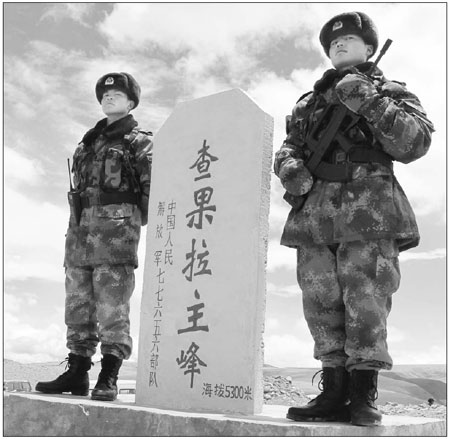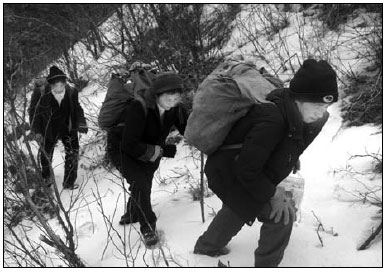
Young guards stand on duty at Chaguola, the highest border sentry post in Tibet autonomous region. Wang Kaihao / China Daily

Three women volunteers from Qinggang village carry supplies up the mountain to the border posts in Yadong county. Liu Youfei / for China Daily
Soldiers on the mountainous outpost overlooking the China-India border in Tibet stoically face inclement weather all year round and other privations. Wang Kaihao reports.
Summer is the best season in Tibet autonomous region but even so soldiers at their sentry posts overlooking the China-India border in Zhanniangshe, Yadong county, still wear their heavy coats.
Du Jiangnan, a 26-year-old border defense soldier on the 4,738-meter mountain outpost, has just come off duty and is taking a rest in his simply furnished dormitory.
As it often does, the conversation turns to the death four years ago of three comrades, which he says, made him appreciate the value of life.
On March 2, 2007, one of Du's fellow soldiers, Yu Hui, was on duty when he slipped down the side of the mountain and was severely injured. Du and five other soldiers were attempting to save him when, suddenly, there was an avalanche, which trapped them.
While the first sergeant stayed with the injured Yu and an army doctor, Du and the other soldiers managed to get out and trekked for 12 hours, their faces frozen and arms bleeding, to get help.
It took a couple of days for the rescue party to find the three soldiers they had left behind. But it was too late.
His three comrades had frozen to death and Du is still haunted by the memory. He makes phone calls to the three soldiers' parents every week. Sometimes, he gathers with other soldiers outside the sentry post to sing songs memorializing his fallen comrades.
"I don't want to say too much because our country knows where we are," is how one song begins, referring to the sacrifices all soldiers make in the course of duty.
"If my fallen comrades knew I was still here at my post they would be proud of me," Du says, tears falling. "I'm going to complete their mission."
Today, there's a safer path leading to Du's military base nicknamed "the post in the cloud". After the tragedy, a staircase of 666 steps was built to connect the post and the recently built gravel road leading to the bottom of the mist-shrouded mountain.
By the side of the gravel road you can occasionally spot locals digging caterpillar fungus, which is used in Chinese medicine. There are also road maintenance workers who keep an eye out for landslides, which happen almost every day.
Every year in October, the steps leading to the outside world are cut off by 2-meter-thick snowfalls for about six months.
